FIFA May Keep Russia and Ukraine Apart in World Cup 2018

The World Cup 2018 would go as scheduled in Russia, FIFA President Sepp Blatter told the global sporting community. But wary of the ongoing realities between Russia and Ukraine, the two countries might be put into two different groups.
On Tuesday, no less than the cosmonauts at the International Space Station unveiled the official emblem of the 2018 FIFA World Cup in Russia. The logo was projected onto the iconic Bolshoi Theatre building in Moscow, Russia's capital. The ceremony was broadcast live during the Evening Urgant television talk show. Blatter, Italian football great Fabio Cannavaro and Russia's sports minister Vitaly Mutko were present during the launch.
Blatter, who said the logo reflected the heart and soul of Russia, reiterated the privilege of hosting the world event cannot be removed out from the country because sport and politics should not mix. In an interview with ITAR-news and R-Sport, Blatter said FIFA fully supports the World Cup in Russia, stressing a boycott "never achieves anything and does not have a positive effect."
But Blatter did admit that tensions between Ukraine and Russia could somehow mar the global sporting event. In view of this, he said the representatives of the two countries would be put into different groups, assuming of course they get to qualify for the 2018 World Cup finals.
In a statement, FIFA clarified Blatter's pronouncement about separating Russia and Ukraine. It said decisions have yet to be made if the two countries will be separated during group matches. The body added the situation between Ukraine and Russia is continuously being monitored, and that the final assessment will happen when the groups are drawn in 2017, if Ukraine qualifies.
"In any qualifying campaign, the aim is always to avoid problems as was done in the past between teams where high tensions can be anticipated. On Ukraine/Russia situation, he said that we have to see how this evolves but, if the geopolitical situation were to remain as it is now, when it comes to the final competition then FIFA could decide that the respective teams would not be in the same group," the statement read.
Along with Russian President Vladimir Putin, Blatter visited Moscow's Luzhniki stadium on Tuesday, still under reconstruction. The stadium has been chosen to host the World Cup finals match on July 8, 2018. Mr Putin likewise reportedly committed to create a Web site "similar to one that gained a good reputation in the Sochi Olympics" so the world can monitor the stages of the World Cup preparations in his country. Russia has allocated about 664 billion rubbles [$17.53 billion] for the World Cup project through 2018.
Member-nations of the European Union, as well as the United States and Germany, have called on FIFA to withdraw the World Cup from Russia. But the global sporting body remained firm in its decision. Some nations now are considering a possible boycott of the 2018 World Cup.





















